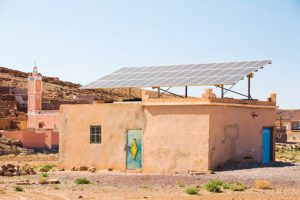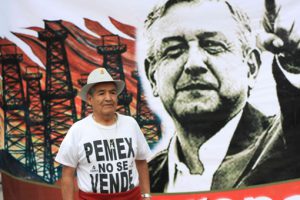Caribbean Energy Security is Good Business
With the exception of gas-rich Trinidad and Tobago, the 14 other countries of the Caribbean Community (CARICOM) are energy importers. In fact, 93 percent of the region’s energy needs are met by oil imports, which average 13 percent of GDP. Venezuela is the main supplier of oil to the Caribbean through the PetroCaribe agreement, formed … Read more
The Outlook for Pemex Reform
This month, Mexico’s Congress is debating the long-anticipated reform of Pemex, the country’s state-owned oil company. This reform comes at a critical moment for Mexico’s energy industry, as oil production has declined steadily since 2004, and Pemex will need to more than double its investment to reverse the trend. The latest energy reform legislation in … Read more
Blackout Hits Venezuela
In the latest in power outage to hit Venezuela this year, a blackout on Monday night left a large portion of Caracas in the dark, with other parts of the country affected as well. Outages were also reported in the states of Vargas, Aragua, Miranda, Lara, Zulia, Carabobo, and Falcón. For many in Caracas, the … Read more
Monday Memo: Honduran Elections – Santos in the U.S. – Petroleum in Ecuador – Peña Nieto – São Paulo Fire
Likely top stories this week: Xiomara Castro leads her supporters in protest against last Sunday’s election results; Juan Manuel Santos visits the United States; petroleum exploitation moves ahead in Ecuador; Mexicans protest as President Peña Nieto completes his first year in office; a fire engulfs the Latin America Memorial in São Paulo. Honduran Election Result … Read more
Monday Memo: Presidential Powers in Venezuela – U.S. oil in Latin America — Bachelet leads first round – Mensalão corruption charges – Cristina Fernández de Kirchner
Likely top stories this week: Venezuela’s National Assembly is increasing presidential powers for President Nicolás Maduro; Demand for U.S. oil grows in Latin America; Michelle Bachelet enters second round of presidential elections in Chile; Arrest warrants are issued for bankers and politicians involved in Brazil’s biggest corruption trial; Cristina Fernández de Kirchner returns to office. … Read more
Tapping Into Latin America’s Oil
On October 21, Indian oil and gas firm ONGC Videsh Ltd (OVL) was among 11 foreign companies in Rio de Janiero to bid for Brazil’s latest oil find, the Libra oil field. The winning consortium was made up of a Sino-European mix of four companies, with Brazil’s Petrobras holding the majority stake. Although OVL didn’t … Read more
Barrick Halts Production At Mine on Argentina-Chile Border
Barrick Gold Corporation, a Canadian mining company and the world’s largest gold producer, announced Thursday that it has temporarily halted operations at its Pascua-Lama gold mine in the Andean border region between Argentina and Chile. Production was scheduled to begin by early 2014, but environmental regulations, depreciating gold prices and declining company profits led to … Read more

Venezuela’s Electricity Deficit
Venezuela is currently suffering its second electricity emergency in three years. The first was declared by the government in February 2010. Closings of major roads, public complaints in the media and frequent outage reports on the #Sinluz (No light) Twitter account paint a grim picture of daily life in Venezuela. The reasons are fairly straightforward: … Read more

Sustainable Energy Access for the Poor
For decades, lending to the poor meant microcredit, and energy related projects rarely fit into that model. The few attempts at intersecting energy and microfinance faltered for various reasons, ranging from the poor energy technologies available at the time to an aversion among microfinance institutions (MFIs) to move to a broader energy-lending program. Even in … Read more
Deadly Gas Explosion in Mexico
Six people were reported dead after a massive gas explosion at a natural gas storage plant near Puebla, Mexico yesterday. Over 100 local residents were immediately evacuated from the surrounding areas and a major highway connecting Mexico City and Veracruz was closed for over four hours. Officials have not yet confirmed what caused the two … Read more
Natural Gas in Mexico: Unrealized Potential
The natural gas situation in Mexico is frustrating when considering the country’s ample supply. While Mexico has significant unexplored potential that would benefit power generation, investment is deficient. The country must currently import liquefied natural gas (LNG) from the Middle East and Africa, paying four times the going rate in North America, in order to … Read more
Brazil’s Pre-Salt Auction and the Development of the Libra Field
On September 18, only 11 companies signed up to participate in the auction of Brazil’s pre-salt Libra oil field, one of the largest offshore oil discoveries since 2007. This outcome fell sharply below the Brazilian government’s expectations. In fact, Magda Chambriard, head of the Agência Nacional do Petróleo (National Petroleum Agency—ANP), said the following day … Read more
Canada’s New American Challenge
With the U.S. administration now engaged in trade talks regarding the Trans-Pacific Partnership, and President Obama’s intention, expressed in his last State of Union address, to embark on a free trade arrangement with the European Union, it is clear that trade policy in the U.S. is in for a major shift. The Canada–U.S. commercial relationship, … Read more

Is the Time Right for Energy Reform in Mexico?
In Mexico, the debate on opening the state oil company, Petróleos Mexicanos (Pemex), to private investment is well under way. On September 8, as President Enrique Peña Nieto unveiled the government’s budget for 2014, several thousand protesters gathered in the center of Mexico City in front of a massive banner that read “Por Nuestro Presente … Read more
Venezuela’s Private Sector Anxious to Invest if PDVSA Builds Confidence
Recent discussions when in Caracas and Maracaibo have made clear that as soon as the late Venezuelan President Hugo Chávez died, the strategy of Petróleos de Venezuela S.A. (PDVSA) became “pragmatism” in the face of “necessity.” My August 29 AQ Web Exclusive described PDVSA’s scramble for production by enlisting the private sector and by meeting … Read more


